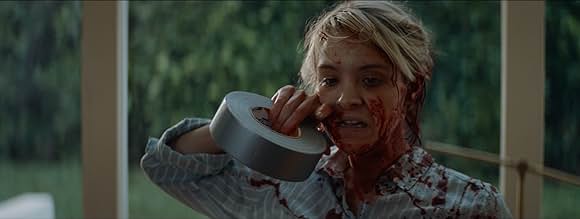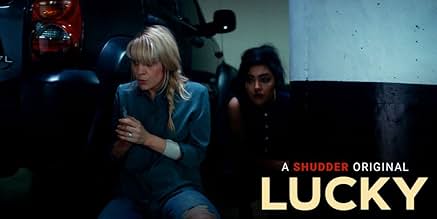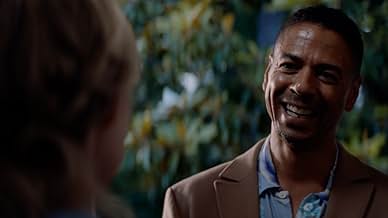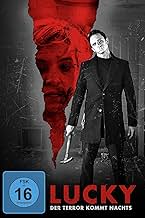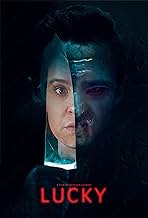Une femme de banlieue est traquée par une silhouette menaçante qui rentre chez elle toutes les nuits. Elle n'obtient pas de l'aide de son entourage, alors elle est obligée de prendre les cho... Tout lireUne femme de banlieue est traquée par une silhouette menaçante qui rentre chez elle toutes les nuits. Elle n'obtient pas de l'aide de son entourage, alors elle est obligée de prendre les choses en main.Une femme de banlieue est traquée par une silhouette menaçante qui rentre chez elle toutes les nuits. Elle n'obtient pas de l'aide de son entourage, alors elle est obligée de prendre les choses en main.
- Prix
- 1 nomination au total
Leith M. Burke
- Rob
- (as Leith Burke)
Nikea Gamby-Turner
- Detective
- (as Nikea Gamby Turner)
Avis en vedette
I dont get all the really bad reviews for this film. It wasnt that bad but it wasn't amazing either just ok. Yes it doesnt explain a lot and yes its a looped plot film but it tries to hard for the deaper meaning than just a typical looped slasher although it probably would have been better if stuck to the loops without the deepness. The acting isnt great and can seem a bit b movie ish at times but they get the job done well enough. It did have potential to be a hell of a lot better but overall it was different from what i expected and i didn't mind that. The direction is the best part of this film. Some good shots and a mellow score with synth elements bring a nice welcomed atmosphere and help set the tone. Its not the best film ever made or the best looped style movie but its worth a watch nonetheless.
I appreciate directors and writers who try to do things a little differently to the constant identical horror movies we see everyday. And I like the fact we get presented with movies that aren't as straightforward as others. This movies reminds me of Mother! While I like the ideas behind the movies and trying to get people to think outside the box, the execution of these films needs to be a little tidier. They start off really interesting and as a viewer, you're really intrigued and excited....and then they just go to a weird place and don't come back, and you're sitting there thinking...'huh?'
There were several plot holes in this film and many things that were introduced were not explained at all. Not everyone who watched will be able to deduce certain clues brought up. It doesn't need to be a blatant in your face explanation that takes away from the mystery of the film, but it does need to be addressed in a way the viewer is like, 'ah, ok...I see what they did there.' It felt unfinished at 1hr 20mins. Could have packed a bit more in to wrap things up.
There were several plot holes in this film and many things that were introduced were not explained at all. Not everyone who watched will be able to deduce certain clues brought up. It doesn't need to be a blatant in your face explanation that takes away from the mystery of the film, but it does need to be addressed in a way the viewer is like, 'ah, ok...I see what they did there.' It felt unfinished at 1hr 20mins. Could have packed a bit more in to wrap things up.
1. Poor or non-existent forensics reduced the credibility of the story.
2. Like a poor teacher the storyline does not direct the audience into thinking about the issue of fear, but instead has us asking what's going on. The focus was on knives, hammers, blood on floor, bodies gone.
3. Bodies disappearing opens many interpretations some of which are nonsensical which added to the confusion. Was she hallucinating; a metaphor; ghosts/spirits?
4. The poor response to securing the home & ways of protecting one's self gives us another female victim character as helpless & lacking intelligence.
5. Even the DVDs special feature of production staff audio commentary overlay said nothing about the story itself, but only camera angles, lighting, etc.
2. Like a poor teacher the storyline does not direct the audience into thinking about the issue of fear, but instead has us asking what's going on. The focus was on knives, hammers, blood on floor, bodies gone.
3. Bodies disappearing opens many interpretations some of which are nonsensical which added to the confusion. Was she hallucinating; a metaphor; ghosts/spirits?
4. The poor response to securing the home & ways of protecting one's self gives us another female victim character as helpless & lacking intelligence.
5. Even the DVDs special feature of production staff audio commentary overlay said nothing about the story itself, but only camera angles, lighting, etc.
The killer mask is cheap. It has little horror effective elements. It is more psychological drama than horror movie. The cool mystery about the loop quickly disappeared. It was hard to care for the main character. I liked the first 20 minutes, and the last 20 minutes because there was finaly some progress. Didn't like the generalisation it gives about men. If you liked the 2019 version of Black Christmas, may be this one is for you.
Writer and protagonist Grant has something to say about violence against women-- something to say about the ways that some women are hobbled by fear of violence. Unfortunately, what Grant has to say is not clear.
Is Lucky a study on the meaningless surreality of some of these fears, that their focus is on some masked stranger in a parking garage rather than on one's husband, the vastly more likely source of violence? Or is Lucky instead arguing that those masked strangers are inappropriately disregarded as a legitimate source of fear? Does Lucky argue that women need to stick together to escape their chains? Or does it instead tell us that women should "Go It Alone" because solidarity is hopeless? When Grant angrily insists that her success is 100% a function of her hard work, are we as the audience supposed to be cheering for her self-regard or shaking our heads at her self-importance? Are we invited to think that all men (save our husbands, of course) are responsible for our fear, or are we instead asked if we're failing to see "Schrodinger's Rapist" as something other than an object-- a man with a face, many men with many faces?
Maybe Grant isn't sure about any of that, and Lucky is just asking a lot of questions. Maybe it's less of a manifesto, more of a meditation. But if so, even that uncertainty is unclear. Lucky merely allows us to be reminded of our own questions-- or of our own certainty regarding the answers-- and if we have none, then Lucky doesn't do anything to change that.
That might be okay sometimes. Like Inglorious Basterds, Lucky seems to be fine with you ignoring the critical questions. In Lucky's case, in favor of just watching a poppy, PG-13 thriller. Unfortunately, Lucky doesn't travel the traditional scales of pop. It is a thought experiment, with little relationship to reality, yet never embraces this, never surprises us with any genuine weirdness. Any transformation here is transient-- abandoned in the third act. And there is no reveal, no catharsis; the unmasking has no impact on the movie as a work of entertainment. There is no denouement. The plot questions are never answered.
But it's not poorly made: the acting is generally decent (although there are occasional awkward missteps); it's not overly long; the production values are good. Lucky may not hit the targets it aimed for, but it's an acceptable way to blow an hour and a half.
Is Lucky a study on the meaningless surreality of some of these fears, that their focus is on some masked stranger in a parking garage rather than on one's husband, the vastly more likely source of violence? Or is Lucky instead arguing that those masked strangers are inappropriately disregarded as a legitimate source of fear? Does Lucky argue that women need to stick together to escape their chains? Or does it instead tell us that women should "Go It Alone" because solidarity is hopeless? When Grant angrily insists that her success is 100% a function of her hard work, are we as the audience supposed to be cheering for her self-regard or shaking our heads at her self-importance? Are we invited to think that all men (save our husbands, of course) are responsible for our fear, or are we instead asked if we're failing to see "Schrodinger's Rapist" as something other than an object-- a man with a face, many men with many faces?
Maybe Grant isn't sure about any of that, and Lucky is just asking a lot of questions. Maybe it's less of a manifesto, more of a meditation. But if so, even that uncertainty is unclear. Lucky merely allows us to be reminded of our own questions-- or of our own certainty regarding the answers-- and if we have none, then Lucky doesn't do anything to change that.
That might be okay sometimes. Like Inglorious Basterds, Lucky seems to be fine with you ignoring the critical questions. In Lucky's case, in favor of just watching a poppy, PG-13 thriller. Unfortunately, Lucky doesn't travel the traditional scales of pop. It is a thought experiment, with little relationship to reality, yet never embraces this, never surprises us with any genuine weirdness. Any transformation here is transient-- abandoned in the third act. And there is no reveal, no catharsis; the unmasking has no impact on the movie as a work of entertainment. There is no denouement. The plot questions are never answered.
But it's not poorly made: the acting is generally decent (although there are occasional awkward missteps); it's not overly long; the production values are good. Lucky may not hit the targets it aimed for, but it's an acceptable way to blow an hour and a half.
Le saviez-vous
- GaffesAt 19:32, when May is talking to Ted's sister Sarah, her iPhone isn't compatible with the case she's using.
- ConnexionsFeatured in Dead Meat Podcast: Interview with Brea Grant (2021)
- Bandes originalesSign of the Times
Written by Hannah Fairlight
Produced by Michael Wagener
Performed by Hannah Fairlight
Meilleurs choix
Connectez-vous pour évaluer et surveiller les recommandations personnalisées
- How long is Lucky?Propulsé par Alexa
Détails
- Durée1 heure 23 minutes
- Couleur
- Rapport de forme
- 2.39 : 1
Contribuer à cette page
Suggérer une modification ou ajouter du contenu manquant




